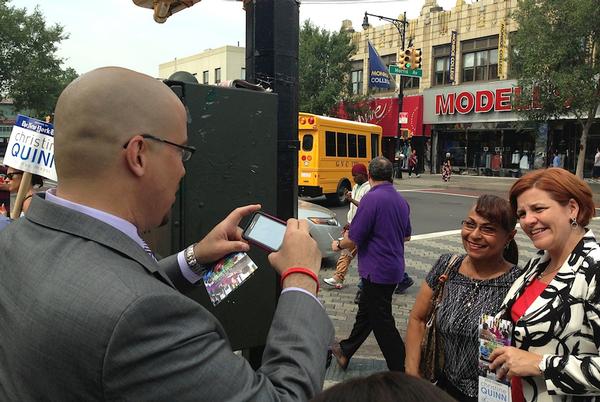
Photo by: Oliver Morrison
State Senator Gustavo Rivera, left, was doing everything he could to help Quinn’s campaign in the Bronx. Frequently he would start a sentence in English and end it in Spanish, as he sought to rally the support of spanish speaking voters. Here he plays photographer for the greatful Miriam Torres.
After casting her ballot this morning in Manhattan, Council Speaker Christine Quinn made four stops in the Bronx, the only borough she hit outside Manhattan on Primary Day. The stops underscored just how important she thought it was to woo and motivate the many Latino voters who live there.
Quinn visited two senior centers with Council Member Annabel Palma and canvassed the street with State Senator Gustavo Rivera near the Fordham Road subway stop on the 4 line. While Quinn staff members had to fight back a throng of reporters at her polling station in Manhattan, only one or fewer television cameras or photographers followed her around for most of her time in the Bronx.
At these four events Quinn had to rely heavily on her fellow political supporters and staff to translate for her. Rivera would frequently start his sentences in English, but then switch to Spanish. “Meet Christine Quinn” he said over and over again, “La proxima alcalde de Nueve York.” (The next mayor of New York).
Hector Figueroa, President of 32BJ Service Employees International Union, would bring over excited Latino voters to meet Quinn after he had made the initial contact. Figueroa claimed to have sent thousands of volunteers to canvas for Quinn across the city, both on primary day, and in the weeks leading up to the voting.
The response she received from voters throughout the day was positive but mixed. Most of the outward demonstrations during the afternoon of campaigning were warm and supportive. The few times people disagreed or expressed disapproval, it was in Spanish, which muted most of the potential conflict for Quinn, who would just move on to the next voter. But when asked about whether Quinn had their vote, many voters gave reasons for not voting or for voting for other candidates.
Many admitted to being confused about some of the logistical aspects of voting, including where, how and when to vote. This was particularly true among the elderly and Spanish speaking populations that dominated these events. A handful of staff members and volunteers did their best with cell phones to help identify voting locations and solve voter problems, which came up frequently.
Palma explained to a crowd of over 50 residents at the Bronx River Neighborhood Senior Center, first in Spanish and then English, that she had heard about some problems with voting machines. “But I beg of you, we don’t want you to walk out,” said Palma.
For many voters today, Quinn’s identity as a lesbian and a female was the most important reason for their support. Some of the most enthusiastic moments came from the gay men and women who came up to her in the street and hugged her without prompting. Lillian Hernandez and Sabrina Hernandez were among those who embraced the speaker. They married on July 24, 2011, the first day it became legal. “She is going to be a nice candidate for us,” said Lillian.
During one moment at the senior center, an elderly resident stood up and gave a speech in Spanish about how important it would be to have a female mayor. This speech received an even louder applause than Quinn’s own. “I don’t need a translator to understand that one,” said Quinn.
There were also voters who either agreed or disagreed with Quinn on a single issue, such as her decision to support the extension of term limits in the city council, or the nuances of her stance on the stop-and-frisk police tactics.
60-year-old African-American nurse Dorothy Shuford, said she was going to vote for Quinn because she agreed with her stance on the police’s “Stop and Frisk” tactics. “Nobody should be targeted by their race,” said Shuford.
A number of voters spoke to Quinn about very specific issues. At the James Monroe Neighborhood Senior Center, for example, volunteer Elizabeth Bello said, “I hope she wins. This building needs to be expanded. It’s overcrowded.” She was referring to the hallways and dining facilities that required staff and visitors to wait patiently as residents tried to squeeze by each other in hallways meant for only one person to pass.
The most consistent message that Quinn and her supporters kept hammering at throughout the day, whenever they could, was that Quinn was the candidate that had and would continue to get things done. She fended off all the hot-button issues from reporters throughout the day, by bringing it back to her pragmatism. Whether it was Ray Kelly’s recent implicit critique of her preparation to combat terrorism, or criticism that she hadn’t separated herself sufficiently from Bloomberg, Quinn tried to portray the other candidates as flip-floppers and political opportunists, and herself as effective.
How important did Quinn consider these last-day efforts? “You wanna keep working to the bitter end,” said Quinn. “We want to make sure every person who is supporting us, gets to the polls.” And after answering another reporter’s question, she handed out another flyer to a hispanic woman walking toward the subway.








